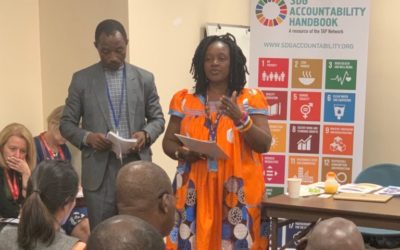TOOLS
SPROCKLERA methodology and tool for story-based research which gives a better understanding of what is happening, changing or emerging in a complex domain.

WHAT?
Methodology and online tool for story-based (narrative) and participatory research.
WHY?
To better understand what is happening, changing or emerging around a complex issue.
HOW?
- Collecting personal stories.
- Visualising patterns in the stories.
- Collectively making sense of the patterns and insights.
RESULTS
Rich overview of experiences, perceptions and needs of people around a complex issue, with starting points for programmes or policies.
PROJECTS
A Sprockler inquiry starts with real-life stories and experiences of different groups of people who have a stake in a complex issue. These people interpret their own stories, using a custom-designed questionnaire. The answers to these questions generate data, which are visualised in dots and graphs using the Sprockler software. This enables us to discern patterns in the stories. In this way, Sprockler combines the best of both worlds: the objectivity and overview of data (the ‘what’), and the nuance, richness and power of stories (the ‘why’).
Purposes
Sprockler is used for various purposes. A Sprockler inquiry provides insight into the needs, perceptions and experiences of large groups of people around a complex issue (e.g. the energy transition or issues of social welfare). This offers starting points for policies, programmes or strategies. A Sprockler inquiry also leads to a better understanding of the impact and effects of programmes and interventions (e.g. for monitoring and evaluation). What has or has not changed, and why?
Process
A Sprockler process consists of five steps:
- Determining what you want to research.
- Designing a questionnaire.
- Collecting stories and data.
- Visualising the stories and data in an interactive report.
- Collectively interpreting the patterns and sharing the results with all parties involved.
Results
By using Sprockler, it is possible to have large numbers of respondents share their experiences with relatively limited effort. The combination of data and stories creates a rich picture of what is going on in a domain (including unexpected and unintended developments) and where the starting points are for (follow-up) programmes or policy.
“Stories are data with a soul” (Brené Brown)
Added value
Sprockler’s strength is in the combination of quantitative patterns in qualitative data (stories). In addition, it is a participatory working method: people not only share their experiences, but also give meaning to their own stories and participate in the collective interpretation of the collected stories and data. This makes Sprockler less suitable for studies that are primarily aimed at just collecting data and converting them into figures.
Attributions
Sprockler builds on the methods and work of many others, such as Participatory Narrative Inquiry (Cynthia Kurtz), Appreciative Inquiry (David Cooperrider) and Sensemaking (Brenda Dervin and Karl Weick).
More information?
- Visit the Sprockler website.
- Contact us to discuss opportunities for working with Sprockler in your context.
Stories about the energy transition
People share their experiences about the energy transition, and discuss what this means for the local policies. Using the Sprockler methodology, we collect citizens’ stories and facilitate dialogue sessions about the local energy story.
The Drenthe Energy Story: residents have their say
Work together well, put the interests of Drenthe first, fit energy projects as well as possible into the landscape, involve residents in the plans from the outset, let the profits from energy generation go to residents and not just to large developers and stimulate local initiatives. The recommendations have been included in the Regional Energy Strategy 1.0 of Drenthe. Perspectivity facilitated the process.
Accelerating sustainability with Neerlands diep Sustainability Challenge
The Neerlands diep (Nd) Sustainability Challenge challenges professionals in the construction and infrastructure sector to accelerate the sustainability of their projects. Participants work at Rijkswaterstaat, ProRail, Rijksvastgoedbedrijf and the Waterschappen....
Evaluating the Prevention up Front Alliance
The Prevention up Front (PuF) Alliance is a five-year joint programme (2016-2020) between the Global Partnership for the Prevention of Armed Conflict (GPPAC) and the World Federalist Movement – Institute for Global Policy (WFM-IGP) that is implemented in strategic...
Evaluation at a distance with YMCA in Togo
In 2017, Y Care International and YMCA Togo launched a project called ‘Inspiring the new generation of entrepreneurs in Togo’. The project aims to contribute to improve the living conditions of vulnerable youth in three slums of Lomé, namely Katanga, Gbétsogbé and...
Lazos de Agua pilots with Sprockler narrative research
One Drop Canada shares their experience using Sprockler: The Lazos de Agua program seeks to provide sustainable access to safe water and improved sanitation and hygiene to around 200,000 people in Colombia, Guatemala, Mexico, Nicaragua and Paraguay by 2022. The...
Our toolbox
In our work, we use a broad range of methodologies and approaches that lean on decades of experimental research. We gratefully build on the theories and concepts developed by our teachers and colleagues. To achieve sustainable results, we determine which method fits every project best.
Methods we frequently use:







